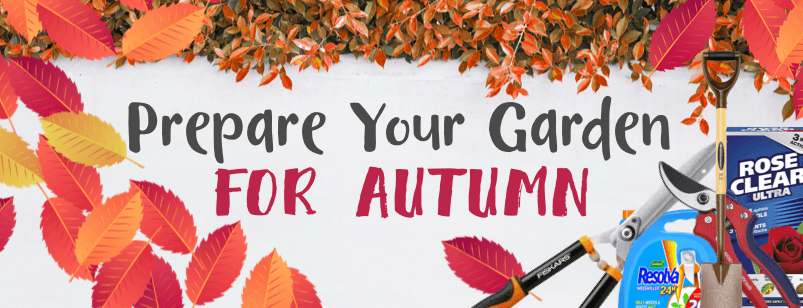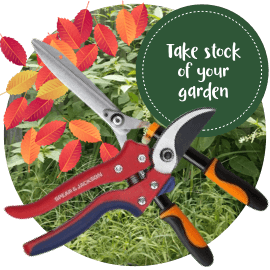Prepare your garden for autumn
Autumn is nearly upon us and with it comes the task of preparing your garden for the season. Aside from the tips we want to share with you, be sure to visit the experts at our Liverpool Garden Centre. You'll get great advice and can pick up the products needed to get the job done.
Take stock
It's important to prepare your garden for autumn if you want to have healthy soil for planting in the springtime. So the steps you take now will be beneficial for the new growing season. The first thing you need to do is take stock of your garden and the condition it's in. For example:
- Look for any bald patches where soil needs to be amended
- Check on plants that have become overgrown and need to be divided
- Take note of bulbs that have to be removed before the winter sets in, as well as which plants and herbs need to be taken indoors
 Move potted herbs
Move potted herbs
Those lovely potted herbs you have been growing and using throughout the summer now need to be brought inside before the weather turns cooler. This also lets you enjoy your fresh herbs for longer. Pots should be moved to a spot that is not exposed to frost or snow and that gets some sunlight. The experts at Almond, Liverpool can tell you which herbs are best for indoor growing.
Soil conditioners
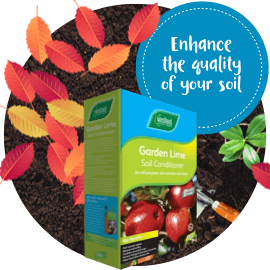
During the spring and summer, the nutrients in your soil become depleted by the plants growing there. Autumn is the perfect time for adding soil conditioners, or amendments to your soil. They release fertiliser slowly into the soil that enhances its quality as we go through the winter months. The conditioner is turned into the soil with a gardening fork.
Be sure to add soil conditioners to bare areas where you have already removed flowers and plants during the spring and summer, or in spots where plants didn't thrive. Doing this as part of your autumn gardening preparation means one less chore to do come spring!
* A note on fertilisers: using a chemical fertiliser will help feed your plants, however, using an organic fertiliser will enrich the soil as well. Organic fertilisers include compost, manure, and mulch. They release nutrients into your soil slowly. All of these can be picked up at Tony Almond and our experts will tell you which treatment is best for your soil needs.
 Kitchen gardens and larger patches
Kitchen gardens and larger patches
Large areas of ground, such as a kitchen patch, needs to be tilled first, and weeds and roots need to be removed. Then you can add your conditioner or mulch to the soil, tilling it again so the nutrients are worked well into it.
 Weed killer
Weed killer
Experts recommend that you use weed killer on your lawn twice a year. The reason for doing this in the autumn is to kill off any seeds that may have landed on your lawn throughout the summer. Doing this now will mean less weed emergence come spring. Tony Almond has a wide range of weed killers to choose from.
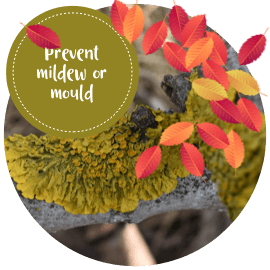 Prevent mould and mildew
Prevent mould and mildew
It's important to remove any mulch from trunks and stems of trees, as well as perennial shrubs in order to prevent mildew or mould from forming that could damage them.
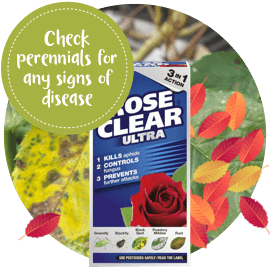 Perennials and trees
Perennials and trees
Examine your perennials for any signs of disease, such as spotted leaves or stems that are rotting. You can either prune the branches, apply a treatment, or remove the infected plant before it spreads to your healthy plants nearby.
Trees need to be checked as well for signs of rotting and damage, and affected branches need to be removed so as not to cause damage to property or people.
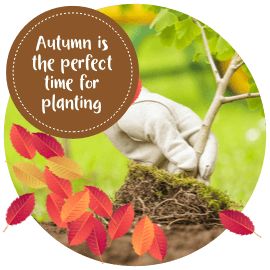 Planting for autumn
Planting for autumn
Autumn is also the perfect time for planting. With the soil still being warm and moist, any newly planted shrubs and trees will have the whole winter to really get their roots into the ground, making them stronger when it comes time for supporting leaves and flowers. There are different times during the autumn months for planting different things.
- Spring-flowering bulbs, such as crocus, daffodils, and hyacinths should be planted by the end of September
- Tulips need to be planted in November
- Any hardy summer-flowering bulbs, such as crocosmia, lilies, and alliums can be planted between September and October
Here are some great shrub, tree, and plant options for planting in autumn:
- Japanese maple
- Spring flowering bulbs, such as bluebells, snowdrops, crocuses, anemones, daffodils, and tulips
- Smoke bush
- Barberry (Berberis Thunbergii)
- Dogwood
- Plumbago
For your kitchen garden, a number of vegetables, herbs, and fruit can be planted now too:
- Baby spinach
- Strawberries
- Lemon trees
- Snow peas
- Radishes
- Garlic
- Coriander
- Mushrooms
- Cauliflower
- Broccoli
- Carrots
- Beetroot
- Onions
- Lettuce
This is just a small example of what you can start planting in your garden now. Our experts at our garden centre in Liverpool can help you pick the best shrubs, trees, flowers, and plants to suit your garden and your style, getting it ready to bloom come spring and summer.
Doing these preparations in autumn makes springtime soil preparation easier and gives you a head start on the planting season. If you're feeling stuck about what needs to be done for your autumn garden prep, stop by Tony Almond - our experts can help you with all of your gardening needs.

